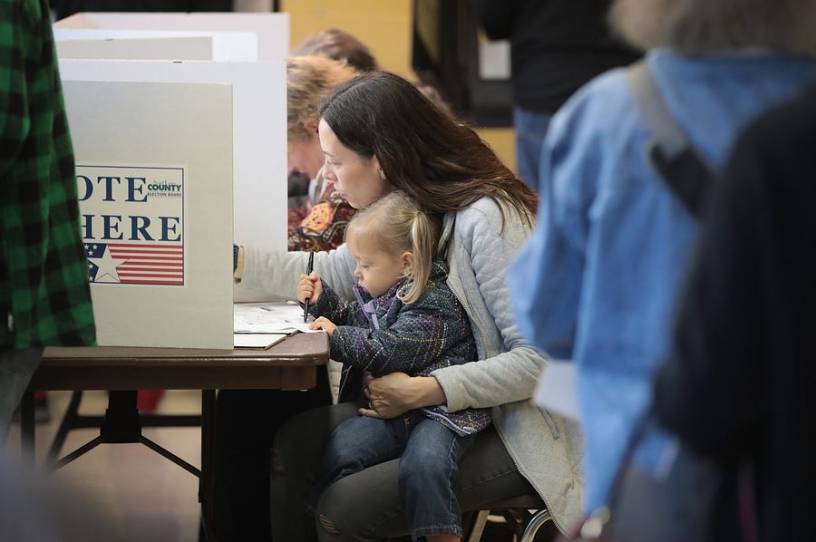What If, Just This Once, We Had Mandatory Voting?

Let’s have an experiment.
Before I propose it, let me set the stage a bit. I have long been a critic of most “reforms” to the voting process. While I’m sympathetic to the idea of making Election Day a holiday, or moving it to an “Election Weekend,” I generally dislike early voting and voting by mail. I despise the idea of online voting. And I think lowering the voting age to 16 is absurd. Under normal circumstances, I’d be much more sympathetic to President Trump’s opposition to mail-in voting this November, though not necessarily in agreement with all of his arguments.
Trump claims that an election by mail would be so rife with fraud and corruption that it would be illegitimate (presumably only if he lost). Fraud should be a concern, but I think he exaggerates the danger considerably. My opposition to mail-in voting is different. I think Election Day should be a national deadline, because deadlines focus the mind and afford everyone the same information to work with. (In the 2020 Democratic primaries, many votes were cast for candidates who dropped out by Election Day.) Voting should take some effort, because that effort separates people who take their vote and their citizenship seriously from those who don’t. I also think Election Day is an important civic ritual.
But, as noted above, these are not normal times. It’s entirely reasonable that governors and other state officials would want to forgo mass-gathering events during a pandemic. We’re seeing a dismaying resurgence in COVID-19 cases because people stopped social distancing for protests, parties and pub crawls.
So, here’s the experiment. Let’s not only allow mail-in ballots, let’s make voting mandatory for everyone, just this once.
There’s a whole school of progressive thought that loves the idea of mandatory voting. Some like it because they believe it would help reduce the allegedly pernicious role of money in our politics. Others like it for often ill-defined idealistic or civic reasons. And some like the idea because they believe there’s a reserve army of very liberal voters out there that would assure all manner of progressive policy victories.
Ironically, Trump subscribes to a similar theory. He constantly speaks—and tweets!—about the vast “silent majority” that is resolutely on his side.
There’s ample reason to believe that both sides are wrong and that universal turnout wouldn’t dramatically change election results. But there’s a debate about that.
So, let’s find out. Under normal circumstances the federal government has little role to play in elections, and rightly so. But a pandemic, like a war, is one of the few legitimate exceptions to the regular order of constitutionally mandated limited government. We don’t know how the pandemic will play out come November. But it’s not unreasonable to assume that, at least in some states, voting at polling stations will be a needlessly risky proposition. So, let’s have the federal government help states to assure free, fair, and universal voting by mail.
While I’m skeptical that a mandatory national vote in a presidential election would change the outcome, it would be interesting to find out whether I’m right. However, I’m more intrigued by the opportunities this would create at the local level.
To listen to Democrats, the GOP is the sole practitioner and beneficiary of “voter suppression” and low voter turnout. But this simply isn’t true on the local level. For instance, you know who loves low voter turnout? Politically powerful, rich, urban teachers’ unions. Turnout for school board elections is usually pathetically low, but not among union members and allied bureaucrats. Think of it this way: If everyone voted in a local election, the share of the electorate made up of teachers and administrators would be the equivalent of a rounding error. But with, say, only 10 percent turnout, they suddenly become a decisive voting bloc that protects its own interests.
The same dynamic can be found with a host of local matters decided at the polls, from bond issues to questions about zoning and policing. The special interests care a great deal because they have skin in the game. But normal voters usually aren’t very informed or motivated on these matters. My hunch is that on questions about things like charter schools, tax hikes, or even police defunding, there’s a real silent majority that rarely speaks up at the ballot box, in part because such questions tend not to be asked during high-turnout presidential elections.
Of course, to prove me right, my experiment would have to involve putting a lot of those issues on the ballot this November. And, like my idea generally, that will never happen.
Photograph by Scott Olson/Getty Images.